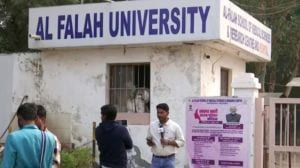Politics and World Cup: An unbridgeable divide?
As much as football, the craze over World Cup is because it gives shape to the vision of a multiracial, meritocratic and free society.

I was in Europe the morning the newspapers headlined “US strike kills Zarqawi” and the general populace woke in eager anticipation of the commencement of the football World Cup. No two events to my mind contrast better the disconnect between the priorities of officialdom and the ordinary person.
Whilst Bush and Blair spoke on TV about the blow to terrorism, but also cautioned against the complacency in the continuing war against the terrorists, the people wanted to ensure that they were in front of the flatscreen to watch Germany kick off against Costa Rica.
The World Cup is an extraordinary event and justifies the accolade “the greatest sporting event on earth”.
This is not because more than a billion people will watch it over the next four weeks; nor because of the surrounding marketing hype; nor certainly because of the hundreds of millions that corporate sponsors have spent. It is because it gives shape to the vision of a multiracial, meritocratic and free society. It highlights the underlying thread that binds people on account of their humanity—irrespective of the boundaries of geography, frontiers, race, caste or class. It is an index of what emergent society could be.
Which is why it is no surprise that the UN Secretary General Kofi Annan admitted in writing that “the World Cup makes us at the UN green with envy”.
More than perhaps any other public event, including the Olympics, the football World Cup is witness to the brotherhood of merit.
You see it in the multiracial and multiethnic composition of the teams including several from countries that are riven by internal tensions. You see it in the diverse backgrounds of the players: Of Ronaldinho from the slums, who’s one of the greatest names in football today.
He was able to do this primarily because of his skill, but also because the football fraternity offered him the opportunity to develop his talent. They did not “reserve” a place for him because he was poor. they ensured that he had access to quality training.
Ronaldinho is only one, albeit the best known example of how talent can overcome adversity. There are several others from comparably humble backgrounds. The fact is that all participants who will take to the field over the next few weeks are there because the system of selection has been essentially free, fair and meritocratic.
The Games are also unique in their political “incorrectness”.
Where else would you find two historic combatants whose enmity dates back hundreds of years and who have only recently been locked in bloody conflict head to head on the field? A situation that might happen if Serbia and Croatia make it to the next round.
Where else has America’s military, technological and economic strength been rendered so irrelevant? It certainly did not help them in their match against Czechoslovakia. In which other forum could Iran’s participation be so seamlessly secured?
The fact is that this tournament breaks conventional and artificial barriers created by contemporary politics and politicians, but not because the people that these politicians purportedly represent wished it so.
True nationalism is on rampant display at the tournament.
The screechings of the fans bedecked in the colours of their national flag is a ubiquitous feature. And incidents and clashes do occur. But it is still a “gentler” nationalism than what one witnessed in 1936, when Hitler used Berlin Olympics to showcase Nazism (only to be humiliated by the success of the black sprinter Jesse Owens) or in 1934 and 1938, when Mussolini used the victory of Italy at the World Cup to bolster his domestic position.
It is also a display that goes beyond nationalism.
Many of those fans do not belong to the participant countries. The turnouts in the pubs in Hong Kong, Malaysia, Singapore and indeed India, has nothing to do with national fervour. It has to do with a basic desire to witness skill and beauty—to praise when praise is due and criticise when expectations are not met.
The world is divided notwithstanding globalization and economic liberalization. This is brought home through the economic twists and turns of policymakers who espouse “one market” in international fora but at the same time raise fortresses around their economy at home. It is a divide that can be bridged, but not if the task is entrusted to governments. They have a crucial role to play, no doubt, but given that all too often politicians get sidetracked by short term personal aspirations, supplementary tools are required.
The market offers one, but then it cannot be relied upon to deliver on equity and social justice. The World Cup is a timely reminder of the importance of sports as an additional implement. Its slogan, “A time to make friends” is an apposite underpinning.
The author is Chairman of the Shell Group of Companies in India. The views expressed are personal



- 01
- 02
- 03
- 04
- 05




























